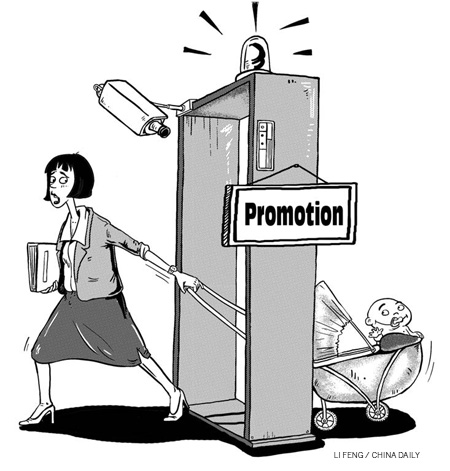Op-Ed Contributors
Better future awaits career women
By William Jankowiak (China Daily)
Updated: 2011-03-09 08:00
 |
Large Medium Small |
I lived in Hohhot, capital of the Inner Mongolia autonomous region, for two years from 1981. One of my many research projects was to investigate the status of housewives and career women. I quickly learned that married women not only controlled family finances, but also took joint decisions on major family purchases. I also learned that they did not fear their husbands.
The workplace, however, was a different story. In the 1980s, most of the students in local universities were males. Female students were diligent, talented and capable, but knew they had to work within a cultural bias that assumed they should be more dedicated to their families, especially children, than their work and career.
The bias in recruitment and promotion that favored men over women arose less from observational assessments of women's real work performance than it did from deep-seated cultural conviction that women were motivated by love for the family, and not career.
Women who were highly ambitious knew that different sets of standards applied to them compared to their male colleagues. To be successful in the 1980s, a woman was forced to hide the practical realities of being a mother from her colleagues and thus never allow family obligations to interfere with her work.
The emergence of a market economy provided an alterative to employment in State enterprises which, combined with the single-child generation's entry into the job market, provided more opportunities, unimaginable in earlier decades, for young women to advance their career. Today, women are out-competing men in the national college entrance examination - as a recent survey shows that about 60 percent of China's college students are female, a story that is also true in many other countries.
Women are ambitious, talented, and acquiring increasingly higher education than men. In the United States and Europe, such women can opt for a job that provides good income and ample opportunities for promotion.
In the US, women who do not have children earn similar amounts as men working in the same profession. Discrepancies in income creep in when women decide to start a family, which often results in a personal decision to reduce their working hours and thus take, in effect, a pay cut. It is childcare and not gender discrimination, as it is frequently assumed, that is the primary reason for the difference in pay between American men and women.
Is China different? A 2010 study shows that about 60 percent of female college graduates prefer a less risky, though not necessarily less demanding job, even if it means getting a slightly lower pay. But about 40 percent (a rather high percentage for exceptions to a rule) of the respondents preferred a job with more risks compared to security. It is therefore incorrect to claim that when it comes to a career, women prefer caution and safety to risks and achievements.
Though the survey did not say so, I suspect that young, educated Chinese women, much like their American counterparts, are aware of the demands of family and career, and are trying to balance the twin obligations. In this respect, Chinese women share much in common with their American counterparts. But unlike in the US, the 40 percent Chinese women who prefer a professional career face problems that their American counterparts no longer do.
Some surveys suggest that the cultural bias against "mother's problem" remains strong in many Chinese companies, which still denies women much deserved promotions. This is less the case in multinational corporations where a different tradition and respect for women's performance ensures that they are given positions based on their ability and not gender. This is the lingering power of cultural bias against women that shapes perceptions and thus expectations.
Many a woman has started a private business after deciding not to work for big Chinese companies because of this bias. While in Hohhot, I found that a number of small- and medium-sized shops and stores were run by very talented women. Some such women have said that the government's policy of making women retire five years earlier than men makes little sense because people, in general, now live longer and many women want to and enjoy work. So women with good qualifications and necessary business acumen, and the urge to work longer, prefer starting their own business.
It is always difficult to predict which way a pattern will go, but in China's case two forces already at work are likely to improve opportunities at workplaces for women.
First, once members of the single-child generation mature and assume positions of authority, they will take measures to undermine skewed cultural convictions that force women to choose between family and career when they could jolly well choose both.
Second, changes in China's demographics will result in a shortage of talented workers - and thus will favor women who desire a professional career. The shortage of talented workers will result in employers adopting a more flexible hiring policy to recruit the best employees and, thus, remain competitive.
This process will take time and will require women to remain focused and not let men slip back into 19th century gender stereotypes that no longer make sense.
The author is a professor of anthropology at the university of Nevada, Las Vegas, and co-teaches a class on marriage and the family at Fudan University, Shanghai.

(China Daily 03/09/2011 page10)
| 分享按钮 |